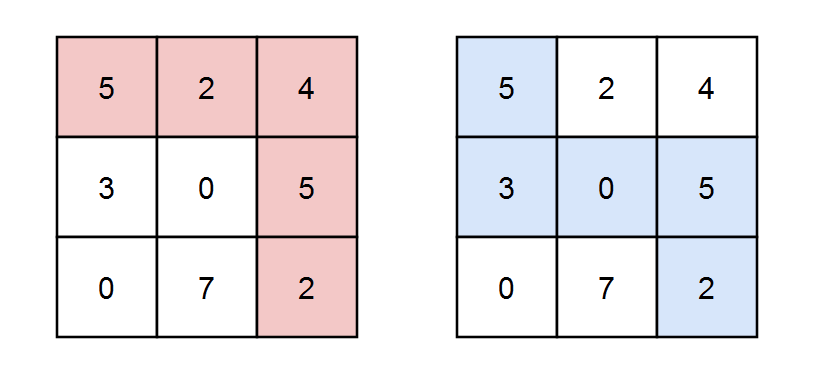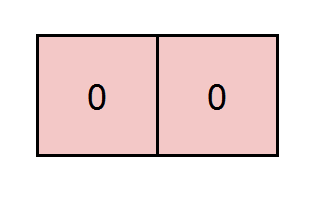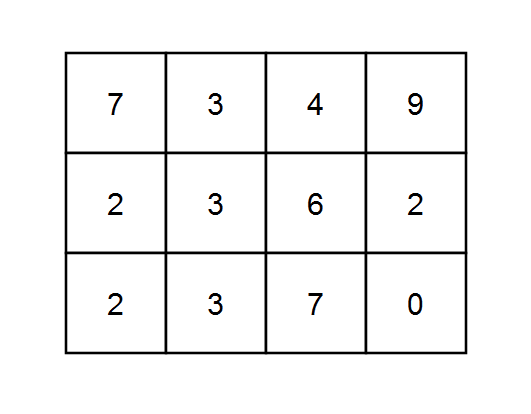Welcome to Subscribe On Youtube
2435. Paths in Matrix Whose Sum Is Divisible by K
Description
You are given a 0-indexed m x n integer matrix grid and an integer k. You are currently at position (0, 0) and you want to reach position (m - 1, n - 1) moving only down or right.
Return the number of paths where the sum of the elements on the path is divisible by k. Since the answer may be very large, return it modulo 109 + 7.
Example 1:

Input: grid = [[5,2,4],[3,0,5],[0,7,2]], k = 3 Output: 2 Explanation: There are two paths where the sum of the elements on the path is divisible by k. The first path highlighted in red has a sum of 5 + 2 + 4 + 5 + 2 = 18 which is divisible by 3. The second path highlighted in blue has a sum of 5 + 3 + 0 + 5 + 2 = 15 which is divisible by 3.
Example 2:

Input: grid = [[0,0]], k = 5 Output: 1 Explanation: The path highlighted in red has a sum of 0 + 0 = 0 which is divisible by 5.
Example 3:

Input: grid = [[7,3,4,9],[2,3,6,2],[2,3,7,0]], k = 1 Output: 10 Explanation: Every integer is divisible by 1 so the sum of the elements on every possible path is divisible by k.
Constraints:
m == grid.lengthn == grid[i].length1 <= m, n <= 5 * 1041 <= m * n <= 5 * 1040 <= grid[i][j] <= 1001 <= k <= 50
Solutions
Solution 1: Memoization Search
We design a function dfs(i, j, s) to represent the number of paths starting from (i, j) with an initial path sum modulo $k$ equal to $s$.
For each position $(i, j)$, we can choose to move right or down, so we have:
\[dfs(i, j, s) = dfs(i + 1, j, (s + grid[i][j]) \bmod k) + dfs(i, j + 1, (s + grid[i][j]) \bmod k)\]The answer is dfs(0, 0, 0). We can use memoization search.
The time complexity is $O(m \times n \times k)$, and the space complexity is $O(m \times n \times k)$. Here, $m$ and $n$ are the number of rows and columns of the matrix, and $k$ is the given integer.
Solution 2: Dynamic Programming
We can also use dynamic programming to solve this problem.
Define the state $dp[i][j][s]$ to represent the number of paths from the starting point $(0, 0)$ to the position $(i, j)$, where the path sum modulo $k$ equals $s$.
The initial value is $dp[0][0][grid[0][0] \bmod k] = 1$, and the answer is $dp[m - 1][n - 1][0]$.
We can get the state transition equation:
\[dp[i][j][s] = dp[i - 1][j][(s - grid[i][j])\bmod k] + dp[i][j - 1][(s - grid[i][j])\bmod k]\]The time complexity is $O(m \times n \times k)$, and the space complexity is $O(m \times n \times k)$. Here, $m$ and $n$ are the number of rows and columns of the matrix, and $k$ is the given integer.
-
class Solution { private int m; private int n; private int k; private static final int MOD = (int) 1e9 + 7; private int[][] grid; private int[][][] f; public int numberOfPaths(int[][] grid, int k) { this.grid = grid; this.k = k; m = grid.length; n = grid[0].length; f = new int[m][n][k]; for (var a : f) { for (var b : a) { Arrays.fill(b, -1); } } return dfs(0, 0, 0); } private int dfs(int i, int j, int s) { if (i < 0 || i >= m || j < 0 || j >= n) { return 0; } s = (s + grid[i][j]) % k; if (f[i][j][s] != -1) { return f[i][j][s]; } if (i == m - 1 && j == n - 1) { return s == 0 ? 1 : 0; } int ans = dfs(i + 1, j, s) + dfs(i, j + 1, s); ans %= MOD; f[i][j][s] = ans; return ans; } } -
class Solution { public: int numberOfPaths(vector<vector<int>>& grid, int k) { int m = grid.size(), n = grid[0].size(); int mod = 1e9 + 7; vector<vector<vector<int>>> f(m, vector<vector<int>>(n, vector<int>(k, -1))); function<int(int, int, int)> dfs; dfs = [&](int i, int j, int s) { if (i < 0 || i >= m || j < 0 || j >= n) return 0; s = (s + grid[i][j]) % k; if (i == m - 1 && j == n - 1) return s == 0 ? 1 : 0; if (f[i][j][s] != -1) return f[i][j][s]; int ans = dfs(i + 1, j, s) + dfs(i, j + 1, s); ans %= mod; f[i][j][s] = ans; return ans; }; return dfs(0, 0, 0); } }; -
class Solution: def numberOfPaths(self, grid: List[List[int]], k: int) -> int: @cache def dfs(i, j, s): if i < 0 or i >= m or j < 0 or j >= n: return 0 s = (s + grid[i][j]) % k if i == m - 1 and j == n - 1: return int(s == 0) ans = dfs(i + 1, j, s) + dfs(i, j + 1, s) return ans % mod m, n = len(grid), len(grid[0]) mod = 10**9 + 7 ans = dfs(0, 0, 0) dfs.cache_clear() return ans -
func numberOfPaths(grid [][]int, k int) int { m, n := len(grid), len(grid[0]) var mod int = 1e9 + 7 f := make([][][]int, m) for i := range f { f[i] = make([][]int, n) for j := range f[i] { f[i][j] = make([]int, k) for x := 0; x < k; x++ { f[i][j][x] = -1 } } } var dfs func(i, j, s int) int dfs = func(i, j, s int) int { if i < 0 || i >= m || j < 0 || j >= n { return 0 } s = (s + grid[i][j]) % k if i == m-1 && j == n-1 { if s == 0 { return 1 } return 0 } if f[i][j][s] != -1 { return f[i][j][s] } ans := dfs(i+1, j, s) + dfs(i, j+1, s) ans %= mod f[i][j][s] = ans return ans } return dfs(0, 0, 0) } -
function numberOfPaths(grid: number[][], k: number): number { const MOD = 10 ** 9 + 7; const m = grid.length, n = grid[0].length; let ans = Array.from({ length: m + 1 }, () => Array.from({ length: n + 1 }, () => new Array(k).fill(0)), ); ans[0][1][0] = 1; for (let i = 0; i < m; i++) { for (let j = 0; j < n; j++) { for (let v = 0; v < k; v++) { let key = (grid[i][j] + v) % k; ans[i + 1][j + 1][key] = (ans[i][j + 1][v] + ans[i + 1][j][v] + ans[i + 1][j + 1][key]) % MOD; } } } return ans[m][n][0]; } -
impl Solution { pub fn number_of_paths(grid: Vec<Vec<i32>>, K: i32) -> i32 { const MOD: i32 = 1_000_000_007; let m = grid.len(); let n = grid[0].len(); let K = K as usize; let mut f = vec![vec![vec![0; K]; n]; m]; f[0][0][grid[0][0] as usize % K] = 1; for i in 0..m { for j in 0..n { for k in 0..K { let k0 = ((k + K - grid[i][j] as usize % K) % K) as usize; if i > 0 { f[i][j][k] = (f[i][j][k] + f[i - 1][j][k0]) % MOD; } if j > 0 { f[i][j][k] = (f[i][j][k] + f[i][j - 1][k0]) % MOD; } } } } f[m - 1][n - 1][0] } } -
public class Solution { public int NumberOfPaths(int[][] grid, int k) { const int mod = (int) 1e9 + 7; int m = grid.Length, n = grid[0].Length; int[,,] f = new int[m, n, k]; f[0, 0, grid[0][0] % k] = 1; for (int i = 0; i < m; ++i) { for (int j = 0; j < n; ++j) { for (int p = 0; p < k; ++p) { int k0 = ((p - grid[i][j] % k) + k) % k; if (i > 0) { f[i, j, p] = (f[i, j, p] + f[i - 1, j, k0]) % mod; } if (j > 0) { f[i, j, p] = (f[i, j, p] + f[i, j - 1, k0]) % mod; } } } } return f[m - 1, n - 1, 0]; } }